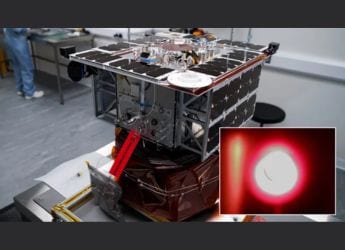- Home
- Telecom
- Telecom News
- EU Slashes Mobile Data Roaming Fees by 55 Percent
EU Slashes Mobile Data Roaming Fees by 55 Percent

The European Union says the surcharges for surfing the Internet on mobile devices while traveling across the 28-nation bloc will be more than halved.
The European Commission says the new cap on the so-called roaming fees will be effective starting Tuesday, just in time for the summer holiday travel season.
It said Monday the price cap for one megabyte of data use will be lowered to 20 euro cents (27 dollar cents) from 45 cents - a 55 percent drop. Phone calls and text messaging services across national borders are also getting cheaper by about 25 percent.
The bloc's executive Commission - keen on being seen as helping the EU's 500 million consumers - cents. d cracking down on the fees in 2007 and seeks to abolish them altogether by 2016.
Earlier this month, EU and South Korea announced plans to jointly research 5G mobile wireless technology.
EU is hoping the Asian country's expertise will help it catch up in a field crucial for economic growth and jobs.
South Korea has one of the fastest mobile broadband networks and is home to Samsung, the world's biggest smartphone maker.
Europe had led the competition in GSM technology - the original standard for mobile networks - in the 1990s, but fell behind the United States and Asia in the rollout of faster 4G connections.
The putative 5G mobile network promises better connections to cope with the ever-increasing number of mobile Internet users. The EU estimates a high-definition movie could be downloaded in six seconds with the new technology, up from six minutes with 4G.
Written with agency inputs.
Catch the latest from the Consumer Electronics Show on Gadgets 360, at our CES 2026 hub.
Related Stories
- Samsung Galaxy Unpacked 2025
- ChatGPT
- Redmi Note 14 Pro+
- iPhone 16
- Apple Vision Pro
- Oneplus 12
- OnePlus Nord CE 3 Lite 5G
- iPhone 13
- Xiaomi 14 Pro
- Oppo Find N3
- Tecno Spark Go (2023)
- Realme V30
- Best Phones Under 25000
- Samsung Galaxy S24 Series
- Cryptocurrency
- iQoo 12
- Samsung Galaxy S24 Ultra
- Giottus
- Samsung Galaxy Z Flip 5
- Apple 'Scary Fast'
- Housefull 5
- GoPro Hero 12 Black Review
- Invincible Season 2
- JioGlass
- HD Ready TV
- Laptop Under 50000
- Smartwatch Under 10000
- Latest Mobile Phones
- Compare Phones
- Vivo Y500i
- OnePlus Turbo 6V
- OnePlus Turbo 6
- Itel Zeno 20 Max
- OPPO Reno 15 Pro Mini 5G
- Poco M8 Pro 5G
- Motorola Signature
- Vivo Y50e 5G
- Lenovo Yoga Slim 7x (2025)
- Lenovo Yoga Slim 7a
- Realme Pad 3
- OPPO Pad Air 5
- Xiaomi Watch 5
- Huawei Watch 10th Anniversary Edition
- Acerpure Nitro Z Series 100-inch QLED TV
- Samsung 43 Inch LED Ultra HD (4K) Smart TV (UA43UE81AFULXL)
- Asus ROG Ally
- Nintendo Switch Lite
- Haier 1.6 Ton 5 Star Inverter Split AC (HSU19G-MZAID5BN-INV)
- Haier 1.6 Ton 5 Star Inverter Split AC (HSU19G-MZAIM5BN-INV)

















